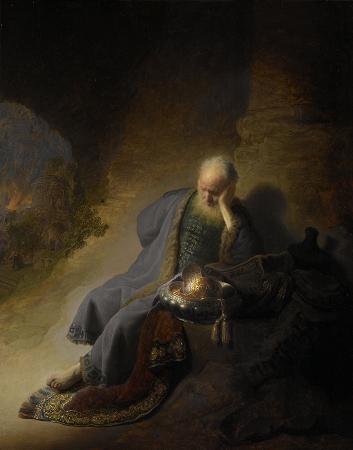Jeremiah. Jeremiah, also called the weeping prophet, was one of the major prophets of the Hebrew Bible. According to Jewish tradition, Jeremiah authored the Book of Jeremiah, the Books of Kings and the Book of Lamentations, with the assistance and under the editorship of Baruch ben Neriah, his scribe and disciple. In addition to detailing many statements attributed by Jeremiah to God, the book of Jeremiah goes into detail regarding physical actions taken by Jeremiah as well as actions which happen to him. Greater detail is known about Jeremiah's life than for that of any other prophet. In spite of such great detail, an opinion expressed is that no biography of him can be written, as there are few facts available. Judaism considers the Book of Jeremiah part of its canon, and regards Jeremiah as the second of the major prophets. Christianity and Islam also regard Jeremiah as a prophet, and he is respectively quoted in the New Testament and his narrative is given in Islamic tradition. Jeremiah's ministry was active from the thirteenth year of Josiah, king of Judah, until after the fall of Jerusalem and the destruction of Solomon's Temple in 587 BC. This period spanned the reigns of five kings of Judah: Josiah, Jehoahaz, Jehoiakim, Jehoiachin, and Zedekiah. Main article: Book of Jeremiah Jeremiah was the son of Hilkiah, a kohen from the Benjamite village of Anathoth. The difficulties he encountered, as described in the books of Jeremiah and Lamentations, have prompted scholars to refer to him as the weeping prophet. Jeremiah was called to prophetic ministry c. 626 BC by YHWH to give prophecy of Jerusalem's destruction that would occur by invaders from the north. This was because Israel had been unfaithful to the laws of the covenant and had forsaken God by worshiping Baal. Jeremiah condemned people burning their children as offerings to Moloch. This nation had deviated so far from God that they had broken the covenant, causing God to withdraw his blessings. Jeremiah was guided by God to proclaim that the nation of Judah would be faced with famine, plundered and taken captive by foreigners who would exile them to a foreign land. The prophetess Huldah was a relative and contemporary of Jeremiah while the prophets Zephaniah and Isaiah were his mentors. According to Jeremiah 1:2-3, Yahweh called Jeremiah to prophetic ministry in about 626 BC, about five years before Josiah king of Judah turned the nation toward repentance from idolatrous practices. According to the Books of Kings, and Jeremiah, Josiah's reforms were insufficient to save Judah and Jerusalem from destruction, because of the sins of Manasseh, Josiah's grandfather, and Judah's return to idolatry. Such was the lust of the nation for false gods that after Josiah's death, the nation would quickly return to the gods of the surrounding nations. Jeremiah was said to have been appointed to reveal the sins of the people and the coming consequences. Jeremiah resisted the call by complaining that he was only a child and did not know how to speak. However, the Lord insisted that Jeremiah go and speak, and he touched Jeremiah's mouth to place the word of the Lord there. God told Jeremiah to Get yourself ready! The character traits and practices Jeremiah was to acquire are specified in Jeremiah 1 and include not being afraid, standing up to speak, speaking as told, and going where sent. Since Jeremiah is described as emerging well trained and fully literate from his earliest preaching, the relationship between him and the Shaphan family has been used to suggest that he may have trained at the scribal school in Jerusalem over which Shaphan presided. In his early ministry, Jeremiah was primarily a preaching prophet, preaching throughout Israel. He condemned idolatry, the greed of priests, and false prophets. Many years later, God instructed Jeremiah to write down these early oracles and his other messages. Jeremiah's ministry prompted plots against him. Unhappy with Jeremiah's message, possibly for concern that it would shut down the Anathoth sanctuary, his priestly kin and the men of Anathoth conspired to kill him. However, the Lord revealed the conspiracy to Jeremiah, protected his life, and declared disaster for the men of Anathoth. When Jeremiah complains to the Lord about this persecution, he is told that the attacks on him will become worse. A priest Pashur the son of ben Immer, a temple official in Jerusalem, had Jeremiah beaten and put in the stocks at the Upper Gate of Benjamin for a day.
more...










